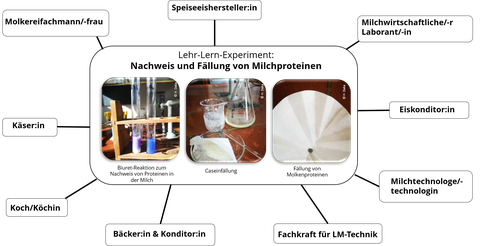Experimente im Unterricht
Naturwissenschaftliche Grundlagen der Nahrungszubereitung
„Der Einsatz von Experimenten im BF E&H bietet großes Potenzial fachwissenschaftliche und praktische Themen, wie z.B. die Analyse von Nährstoffen oder Backprozessen in einer anderen Lehr- und Lernform aufzugreifen.“ (Bordewick-Dell et al., 2018)
Die Verarbeitung von Lebensmitteln ist angewandte Chemie, Biologie und Physik. Dabei stellt die „einfache“ Erklärung eines Naturphänomens eine besondere Herausforderung für angehende Lehrkräfte dar. Nur, wenn angehende Lehrende eine wissenschaftliche Denk- und Arbeitsweise beherrschen sowie in der Lage sind naturwissenschaftliche Phänomene zu erschließen, gelingt die didaktische Reduktion von Lerngegenständen. Mit dem Einsatz von Lehr-Lern-Experimenten im Unterricht kann sowohl eine Annäherung an die wissenschaftliche Methodik als auch eine Steigerung der Motivation und somit der Lerneffektivität erreicht werden. Das Ziel des Praktikums „Versuche mit Lebensmitteln“ ist es daher, Lehr-Lern-Experimente im handlungsorientierten sowie lernfeldstrukturierten Unterricht zu planen und zu gestalten. Dabei wird auf die erworbenen Kompetenzen aus den Fachwissenschaften Lebensmittelchemie und –technologie sowie Lebensmittelwarenkunde und angewandte Biochemie aufgebaut. Die Beurteilung sowie Reflexion des Einsatzes von Lehr-Lern-Experimenten im Berufsfeld Ernährung und Hauswirtschaft sind essentiell, um Lehr-Lern-Experimente vor dem Hintergrund des Erwerbs einer beruflichen Handlungskompetenz einordnen zu können.

